Q&A: How Phillies manager Rob Thomson harnesses baseball's human element
Since Rob Thomson became the Philadelphia Phillies manager early in the 2022 season, few teams have exceeded expectations like his.
When he replaced Joe Girardi in June of that year, the Phillies were 22-29 and falling well short of their aspirations. But they finished the regular season 65-41 under Thomson and advanced to the World Series despite being the third wild card on the National League side. Last season, as the top wild card, they went to the National League Championship Series after knocking off the 104-win Atlanta Braves in four games.
The performance of a major-league manager is difficult to evaluate. We can make judgments about whether they pulled a pitcher at the right time, or if they are optimizing how they build a lineup or utilizing a pitching staff. But we rarely get to see behind the curtain to understand how they communicate the game to their players and how they deal with the human element. We don't get a great feel for whether they get the best out of their players.
Thomson seems to do just that. With him at the steering wheel, it seems the Phillies play their best in the biggest moments. Thomson embarks on his third season at the helm when pitchers and catchers report to spring training Wednesday.
theScore recently sat down with Thomson, a Sarnia, Ontario, native who previously spent 28 years in the New York Yankees organization, including a decade on the major-league staff. We wanted to get a glimpse into the 60-year-old's process. We wanted to learn about the influences on his career, how he makes decisions, and how he manages the human aspect.
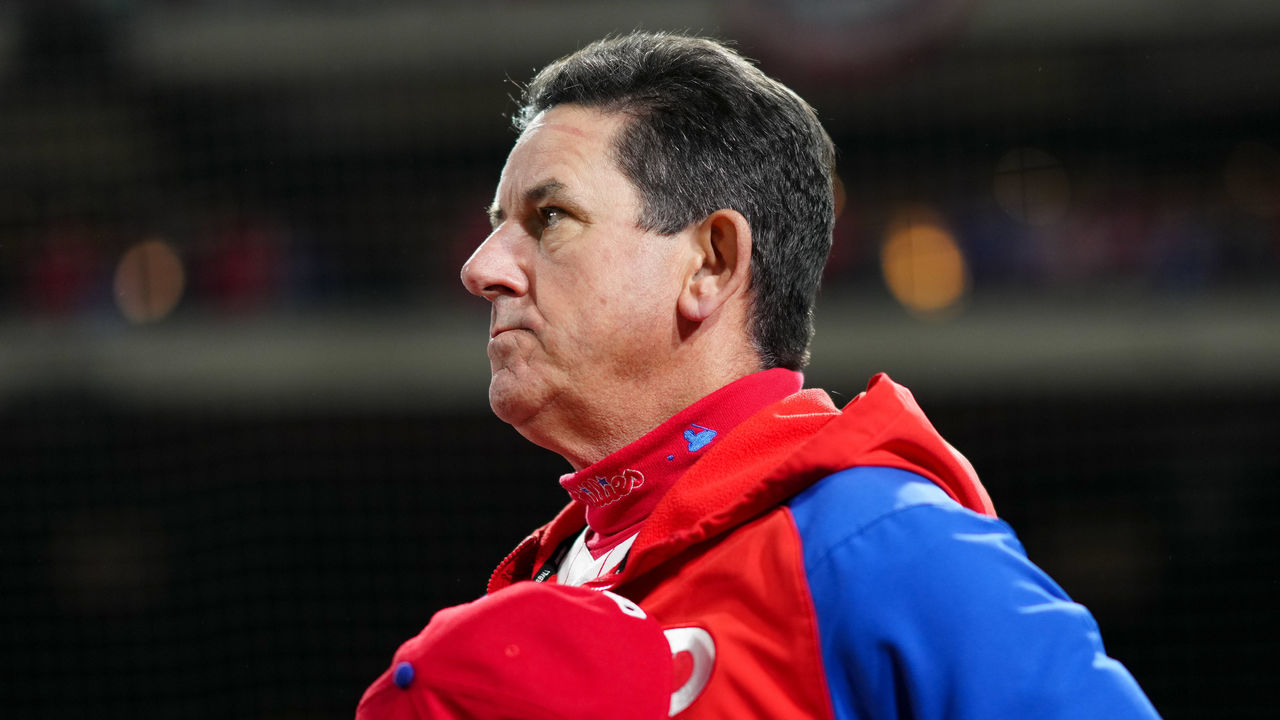
The interview has been condensed and edited for clarity.
theScore: How did being raised in Canada influence you?
Thomson: I think being here, in this seat right now, my youth, and where I grew up has helped me with this job. I really do. ... I come from a blue-collar type of background, and I think that's embedded into me. Both my grandfathers worked on the railroad in St. Thomas (Ontario). My father's father was an engineer on the New York Central back when they had to shovel the coal into (the steam engine's firebox). ... I'd remember him coming home from work and he'd have a sleeveless undershirt on, washing up, covered in soot - it was like working in a coal mine. Just the muscles on him. I love to work, and I spend a lot of hours at it.
Baseball in Canada is really about fundamentals. So my fundamentals were very good. Also, I think playing hockey helped because there is a certain toughness that hockey gives you. And certainly, the coaches, my youth coaches, had a lot of influence. Being a Canadian and going to another country, a country that in theory is better than mine at this sport, can be a little intimidating.
(Thomson played college ball at the University of Kansas and was a 32nd-round pick of the Detroit Tigers in 1985. He never advanced beyond Single-A.)
I think that built some toughness in me, too. But it also built in some empathy. I have a lot of empathy for Latin American players, Japanese players, and what players from other countries playing in the U.S. might feel. No. 1, the culture is different. Certainly, the language is different for many. I think you have to have empathy. In many ways, (players) are like your kids. You have to be tough at times. But they are human beings. They struggle. They lose confidence - that's when empathy comes in. I care about people. It's all about the greater good for me. I think that's a Canadian thing, too. It's all about the greater good.
theScore: What did you learn or borrow from Joe Torre, having worked under him on some of those great New York Yankees teams? (Torre nicknamed Thomson "Topper" because he was on top of everything when it came to running spring training.)
Thomson: Torre was very calm. We got beat by Boston in 2004. We were up 3-0 in the ALCS. We lost four straight, the only time it's ever happened. I waited for him to do his press conference - it's Game 7 at Yankee Stadium. I knocked on the door and said, 'Hey Skip, how are you doing?' He was behind his desk, he had his glasses on just like this (Thomson mimicks glasses being pushed to the end of the nose). He's on his phone. He's texting somebody. He looked up and he said, 'Well, I'm doing a lot better than you are.'
I said 'What? Why?' That was my first year in the big leagues.
He said, 'Before you got here, this had never happened.'
He was just kidding. I was thinking to myself, 'Goddamn, that was one of the biggest losses in Yankee history, and this guy is calm. He is OK.' He cannot control some things. Just move on. He just sucked it up and that's what I try to do, too.
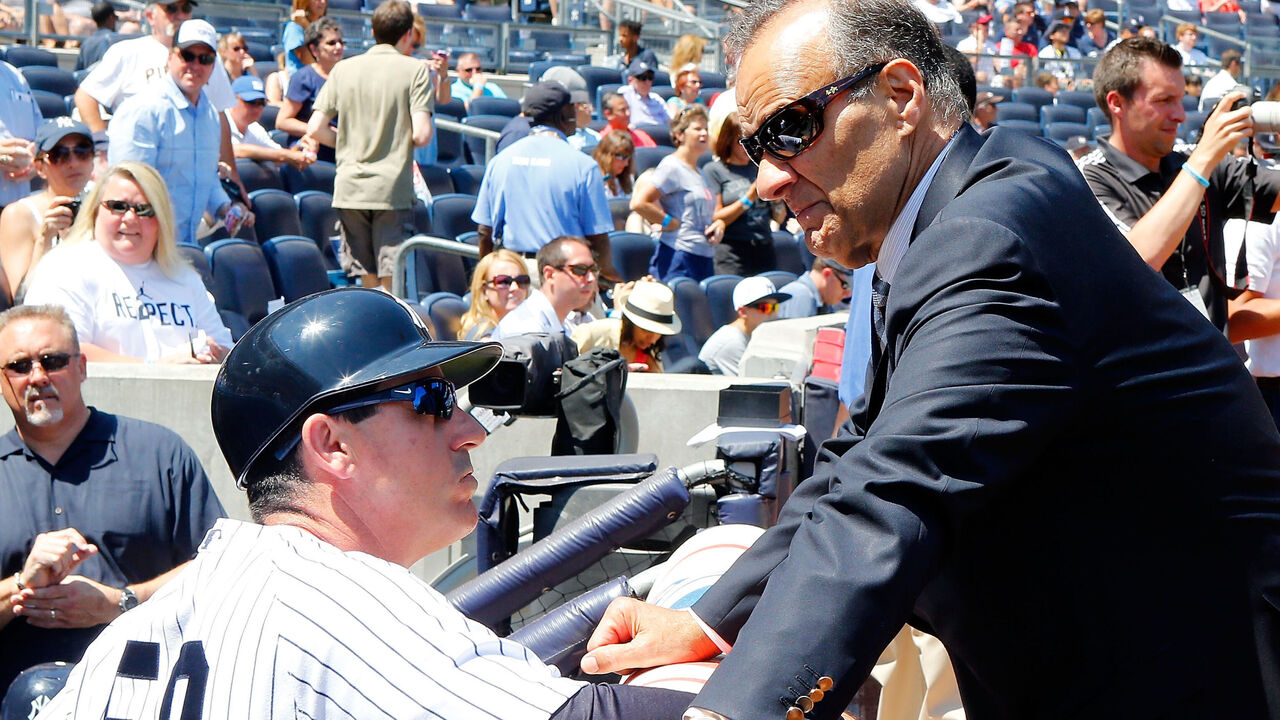
theScore: When you were promoted to replace Girardi in 2022, players cited a change in the clubhouse environment. Can you explain how you arrived at this serene disposition the players say is effective?
Thomson: My father's philosophy on life, in general, was very similar to Joe Torre's and that is: Some things you cannot control, so don't worry about that stuff. There's a lot of things you cannot control, so just stay calm.
I think as a kid, playing hockey to playing baseball, because you're a kid, you get rattled sometimes. You lose your confidence. You make a bad play. Or maybe you're overconfident. If I was down, my father would bring me up. If I'm way up, he'd bring me down. That's who he was. It was always about staying the same all the time, whether you're going good or not. You stay the same. Don't let anybody see you beat your chest or hang your head.
If we are going through a bad stretch, it might just be walking through the clubhouse after a tough loss and saying, 'Boys, just get them tomorrow. It's going to be alright. Don't worry about it.' I think players like that and respect that. That the guy in charge is under control.
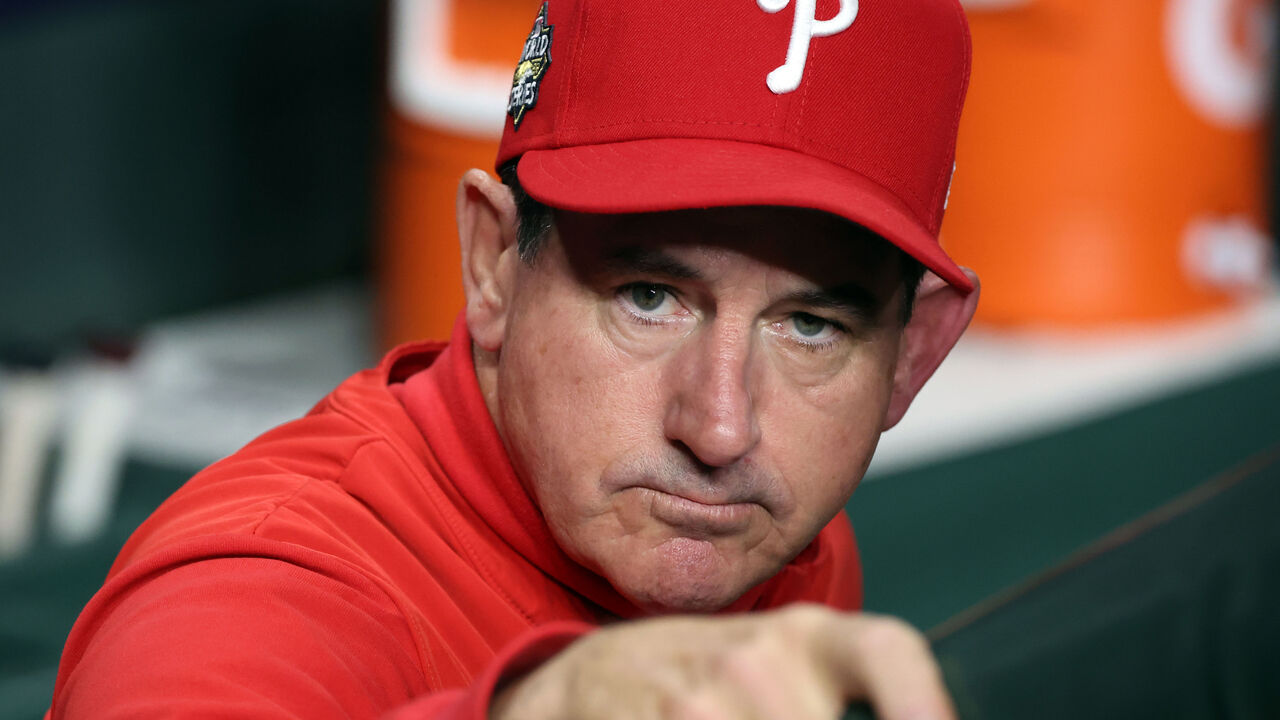
theScore: Does this approach explain some of the postseason success?
Thomson: I stress for us to be as calm as we possibly can. I think there are guys who, innately, they might not slow the game down, but they keep the game at the same pace in their mind and their body, whether it's the first inning or ninth inning: Derek Jeter. Bryce Harper. Those guys are considered clutch guys. They just keep the game the same. The same pace.
theScore: I am interested in your decision to not tell Ranger Suárez before his start in Game 1 of the NLDS versus the Braves that he was going to be pulled early. (The Phillies won and Suárez pitched effectively into the fourth inning.) That spoke to me about how important it is to know the player, and what he will respond to. What led you to make that decision to not tell him?
Thomson: When we have time - sometimes decisions are split-second - I talk to Caleb Cotham, our pitching coach, and our bench coach, Mike Calitri. I said, 'OK, here is what our plan is. Is it best to tell Ranger now so that he understands there is a certain point when he is coming out of the game, and there is not this ruckus, you know? Or, do we just let him go, so that he doesn't try to do too much so that he pitches his normal game?'
We came to the decision that we just weren't going to tell him, and we'll explain it after he comes out of the game. We knew it was going to be a short start. ... The way the schedule was with a game, day off, game, day off, we had a lot of days off for our bullpen to rest so we were just trying to match up the best way possible. We just felt like just letting Ranger go out and be himself, and pitch the way he normally does would be best, and he did. He pitched great.
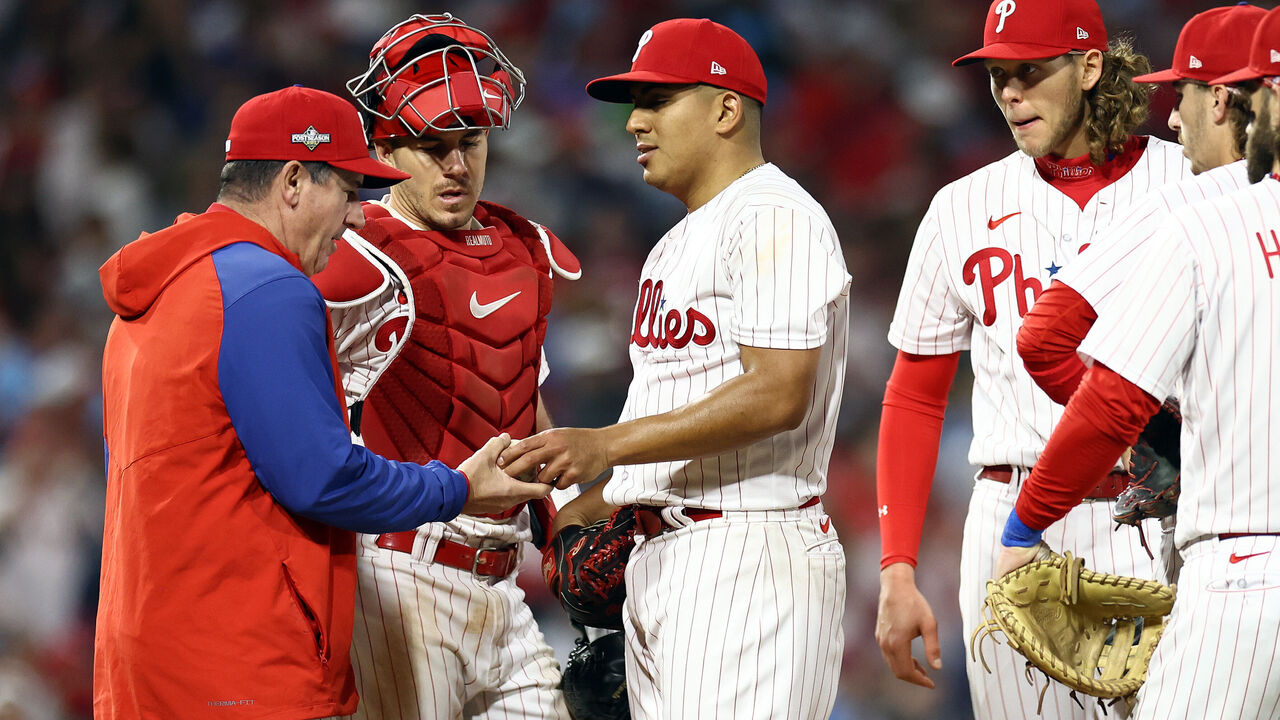
theScore: One of the changes you made when you took over in 2022 that interested me was you began texting players the lineups a day or days in advance. They would no longer show up at the clubhouse to learn if they were playing that night. For instance, when I was a beat writer, I'd see players, on occasion, enter the clubhouse, look at the lineup card, not see their names, and storm into the manager's office. It seems like avoiding such scenarios might allow for better peace of mind. How did you arrive at that?
Thomson: I think nowadays with texting and different apps on your phone you see it (lineup sharing) more often than you did before. The players like it because we are communicating all the time. And I try to stay a couple days ahead with the younger guys, knowing when they are going to get a day off.
So for example, Johan Rojas, when he first came up, he ended up playing every day at some point. When he first came up, I always wanted to be a couple days ahead. So if it's Wednesday, on Saturday I'm giving you that day off. That way, let's say he's supposed to have Saturday off, if on Friday he goes 0-5 with four punch-outs, it doesn't look like I've lost confidence in him. I already told him you are getting Saturday off no matter what. You can go 0-for-5 with four punch-outs, or 5-for-5 with three homers, either way, you are getting Saturday off. ... They can just turn their minds off. Have a good night's sleep. Nothing is rolling in their head.
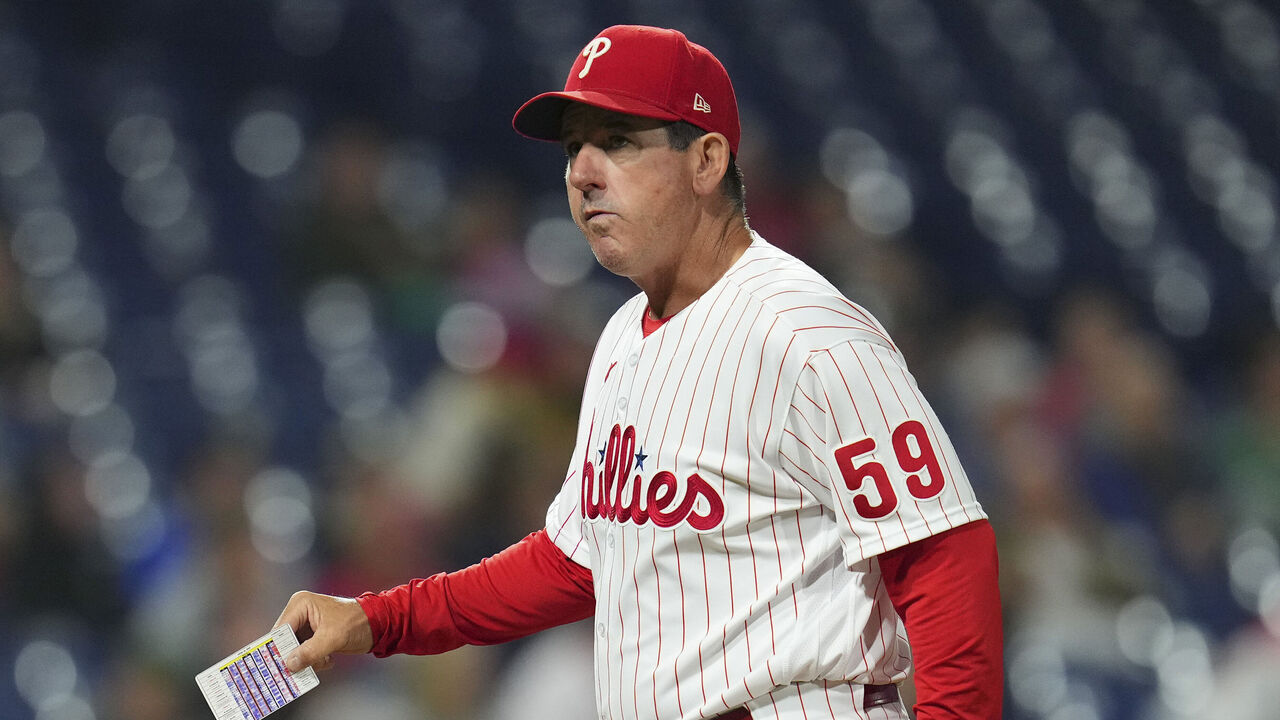
Joe Torre, when I was coaching for him, he would always tell the catchers like Jorge Posada and John Flaherty, 'OK, we have a night game on Friday, a day game on Saturday. Georgie, you're getting Saturday off. Flash, you are playing on Saturday.' It really worked well. And they really liked it. I thought, 'Why can't you do that with all of the guys?'
So we try to stay three or four days ahead. In spring training, we are always five or six days ahead. ... It doesn't mean it's etched in stone, it just means this is what I'm thinking, and this is where we're going to go.
theScore: How do you gather that information and insight into the psychological makeup of players to understand how to best communicate with them?
Thomson: I lean on the coaches, too, because sometimes they know the personalities better than I do, because they are with them all the time. The hitting coach is with them all the time. He knows a lot of what is going through their minds, where their confidence level is, and things like that.
theScore: How did you handle expectations coming off the 2022 World Series appearance?
Thomson: I told the ballclub at the start of the year there are going to be expectations on this team. That, to me, is just noise. What's most important about expectations is what ours are, and what mine are. 'All I want you to focus on is that we have five pillars: respect the game, prepare, compete, be selfless, and have fun.' If this group does those five things, we are gonna be where we need to be. ... We maintain those five pillars and we talk about it at times.
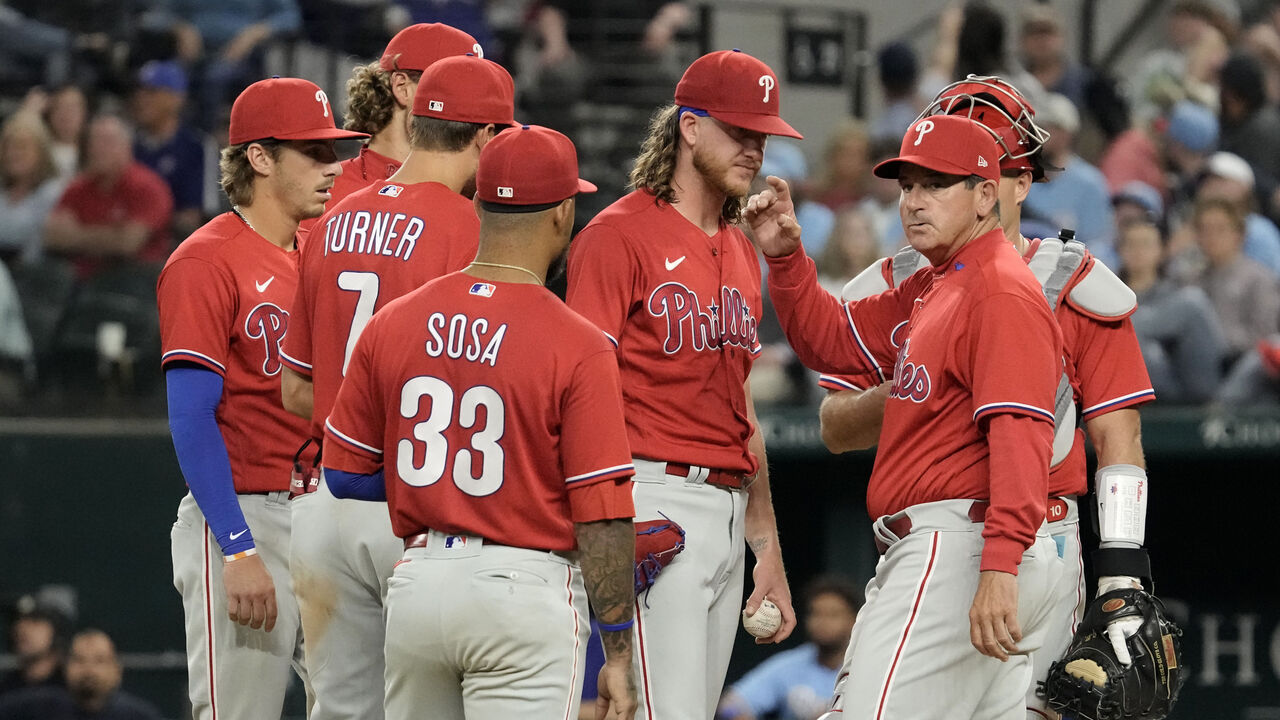
theScore: Do you second-guess yourself when a decision fails?
Thomson: There are times when you make decisions that don't work out. If you don't have a reason for it, that's a problem. But if you have a reason, and it doesn't work out, let's figure out what went wrong in your decision-making. ... Sometimes there's nothing, it's just baseball.
I always look back at things that went wrong during a game. A pitching decision or whether we pinch hit for a guy or not. I look back at it, and study it, and say 'OK, what went wrong here? Even some things that went right, 'OK, that worked out but was that really the right decision?' I'm always talking to coaches, looking at film, going 'OK, was there a better way to do that?'
Travis Sawchik is theScore's senior baseball writer.
HEADLINES
- Breslow: Cora deserves 'a ton of credit' for Red Sox play despite injuries
- Blue Jays in April: Fancy new seats and a sense of dread
- Ex-Dodgers pitcher Urías pleads no contest to misdemeanor domestic battery charge
- Buehler to make 1st start since 2022 on Monday
- Comcast-Bally Sports breakup is another blow for dying TV ecosystem